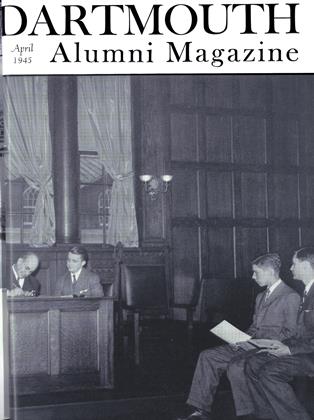SOME weeks ago the Honorable Lewis Parkhurst asked me for a list of 25 books that he might add to the library which he has given the Norfolk Prison Colony in Massachusetts. Here is the list which perhaps you may find useful, too. All are recommended.
Samuel Johnson, by Joseph Wood Krutch (Henry Holt). An admirable book but I suspect that most readers will skip certain chapters dealing with Johnson's writings. They are good, however, but only English scholars will fully appreciate them.
Flight to Everywhere, by Ivan Dmitri (McGraw Hill). This book by Levon West, the etcher, contains the best flying photographs I have seen. Many are in color. The text is all right, too.
Westward the Women, by Nancy Wilson Ross (Knopf). An interesting book about the women who pioneered across the plains over a century ago and settled in Oregon.
So Long, Son, by Howard Vincent O'Brien (Putnam's). A very moving short story about a father and son during the war; how a father reconciles himself to the loss of his boy.
Battle Report, by Karig & Kelley (Farrar). An official report of the dark days from Pearl Harbor to Coral Sea. No histrionics and all the better for it.
Women and Men, by Amram Scheinfeld (Harcourt). Fascinating and scientific account of the differences between men and women. Excellent for all readers over eighteen.
A Guide to Naval Strategy, by Bernard Brodie (Princeton). This fine book has been brought up to date, though not including the Battle of the Philippines.
Invasion Diary, by Richard Tregaskis (Random House).
\ / Sad Sack, by Sgt. George Baker (Simon & Schuster). One of the really funny car- toon books of the war.
Daybreak for Our Carrier, by Max Miller (McGraw Hill). An account of the life on a carrier. Excellent.
The Democratic Spirit, by Bernard Smith (Knopf). An anthology.
Escape via Berlin, by Jose Antonio de Aguirre (Macmillan). The best escape book of the war; the story of a democrat in the grip of the Gestapo. It reads like a nightmare but the author finally comes through via Berlin.
Damned to Glory, by Col. Robert L. Scott Jr. (Scribners). Not quite up to his first book but good stories of our flyers none the less.
Air Gunner, by Hutton & Rooney (Farrar). This story by two air gunners really gives you the straight story of how thousands of our airman live, fight, and die. You will remember for a long time the stories of Arizona Harris, and Roscovich, who had the curious habit of snipping neckties. Of combat they say, "Combat is hard to catch in words. You say, maybe, twenty-millimeter shells smashed through the turret, ripped through the fuselage. But no phrase will tell the empty five seconds in the guts of every man aboard as they waited and even felt to know whether that had been THE attack."
Life is Too Short, by C. Kay Scott (Lippincott). An unusual and excellent autobiography which you probably missed, as I did.
Leningrad, by Alexander Werth (Knopf). The gallant story of how the people of Leningrad withstood Germany's senseless shelling. Contains also some interesting comments on the Finns who aligned with Hitler much to their own disadvantage. The Winds of Fear, by Hodding Carter (Farrar). An unusually good and, I think, truthful first novel about a small southern town and its present day problems and tensions.
Basic History of the United States, by Charles and Mary Beard (New Home Library).
The American Character, by D. W. Brogan (Knopf). Don't miss this one. Crazy Weather, by Charles McNichols (Macmillan). Very good story of a boyhood in the far west.
Pipeline to Battle, by Peter Rainier (Random House).
A Short History of Russia, by B. H. Sumner (Reynal). This was recommended to me by the editor of the Russian Review, Dr. Dimitri von Mohrenschildt, a welcome addition to our faculty.
State of the Nation, by John dos Passos (Houghton). A Passos view of these United States during wartime.
The Forest and the Fort, Bedford Village, by Hervey Allen (Farrar). These two volumes describe life in western Pennsylvania in the early days. The second volume doesn't quite measure up to the first but good nonetheless and I look forward to the others to follow.
Don't overlook the Smithsonian Institution War Background Studies. They are first class and obviously written by experts.
A SCHUSSING PROFESSOR in the above garb is not so strange these days, what with commencement held in winter. Prof. John B. Stearns '16 of the Classics Department is shown setting out for the Navy V-12 graduation exercises on February 11.
 View Full Issue
View Full Issue
More From This Issue
-
 Article
ArticleRADIO WAVES AND RADAR
April 1945 By GORDON FERRIE HULL JR. '33, -
 Lettter from the Editor
Lettter from the Editor'Round the Girdled Earth
April 1945 By H. F. W. -
 Article
ArticleLaureled Sons of Dartmouth
April 1945 By H. F. W. -
 Class Notes
Class Notes1918
April 1945 By ERNEST H. EARLEY, DONALD L. BARR -
 Class Notes
Class Notes1945
April 1945 By ARTHUR NICHOLS -
 Article
ArticleMedical School
April 1945
HERBERT F. WEST '22
-
 Article
ArticleHANOVER BROWSING
December 1934 By Herbert F. West '22 -
 Article
ArticleHanover Browsing
April 1937 By HERBERT F. WEST '22 -
 Article
ArticleHanover Browsing
January 1938 By HERBERT F. WEST '22 -
 Article
ArticleHanover Browsing
November 1940 By HERBERT F. WEST '22 -
 Article
ArticleHanover Browsing
January 1945 By HERBERT F. WEST '22 -
 Article
ArticleHanover Browsing
February 1948 By HERBERT F. WEST '22







